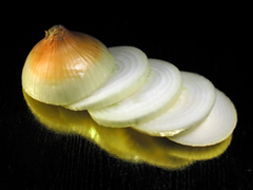…So Nutritious They Will Make You Cry!
 A member of the lily family along with leeks, chives, scallions, and garlic, onions are one of the most cultivated and consumed vegetables in the world.
A member of the lily family along with leeks, chives, scallions, and garlic, onions are one of the most cultivated and consumed vegetables in the world.
But despite their popularity, many people don’t realize just how nutritious they really are. So first…
A Little History
The hardy onion — a possible staple of the prehistoric diet — is definitely an oldie but goodie, having been cultivated by civilizations for more than 5,000 years.
Ancient Egyptians regarded onions as objects of worship. They symbolized eternity (due to their circle-within-a-circle structure) and buried them with their Pharaohs.
Some historians believe Egypt’s reverence for the onion stemmed more from its medicinal properties. Onions were appreciated for their antiseptic qualities, which were perceived to be magical and very handy in the afterlife.
The medicinal reputation of onions only grew as centuries passed. By the Middle Ages, onions were prescribed to treat a wide range of problems from headaches to hair loss and snakebites, and early American settlers used them to battle cold, coughs and asthma.
Nowadays, science has finally caught up with the onion, and the news is terrific. Nutritionists, food scientists and practitioners of natural medicine have come to appreciate the onion as a nutritional powerhouse and a natural source for all sorts of health-promoting phytochemicals and nutrients.
Quercetin: A Versatile, Natural Weapon Against Disease
One of the key nutritional benefits of onions is the presence of quercetin, a group of plant pigments that give vegetables, fruits and flowers much of their color.
Numerous studies have demonstrated that quercetin does all kinds of good things for your health. For example, quercetin inhibits the low-density lipoprotein oxidation that contributes to coronary heart disease and atherosclerosis, and protects and helps to regenerate another popular and powerful antioxidant: Vitamin E.
Quercetin can be found naturally in a number of dietary sources, but the amount you absorb from consuming tea or apples, for example, pales in comparison to what you get from onions. (Red and yellow onions are among the best sources of quercetin.)
Finally, the quercetin in onions works as a natural anti-inflammatory to reduce pain and reduce the body’s risks of cancer and heart disease.
So though they may make you cry when you cut into them, enjoy plenty of onions in your diet!
And while we’re on the topic of powerful natural anti-inflammatory ingredients, DO NOT MISS the 12 most powerful of all below…
See The Top 12 Inflammation- and Pain-Fighting Ingredients Now!

